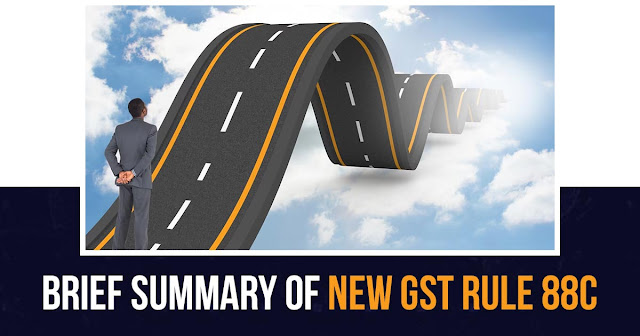After the 48th GST council, it has been decided that the method of handling the discrepancy in liability in the statement of outward supplies (GSTR-1) and that reported in return (GSTR-3B) has been configured rule 88C of the CGST. The taxpayer is expected to be affected by the rule in case of any differences between the data in GSTR-1 and GSTR-3B. The taxpayer will be responsible to ensure compliance.
The Rules That Apply Are As Below-
- The tax liability under GSTR-1 surpasses the tax liability under GSTR-3B. The registered person will be given a system-generated statement in Part A of form DRC-01B and the stated amount and percentage.
Within 7 Days, the Registered Person is-
- Liable to pay this differential tax fully or partially including the interest and grant the same in Part B of Form DRC-01B.
- Expected to grant a response stating reasons according to unpaid differential liability in Part B of Form DRC-01B.
- The stated amount shall be redeemed in some cases such as if the differential tax liability is not paid within the given time, where no explanation or reason is granted, or where a similar reason is not acceptable by the concerned officer.
First, let's examine if this rule is backed by a statutory rule. It has been provided in Section 75(12) of the CGST Act that unpaid or short-paid self-assessed tax can be recovered directly as per GSTR by the GSTR-3B not adhering to the demand procedure enacted under the Act. This sub-section allows the inclusion of the tax payable according to self-assessed tax. It shall be according to the information of outward supplies equipped in Form GSTR-1, but it may not be included in Form GSTR-3B. Hence, in case of any discrepancy in the liability reported in GSTR-1 and GSTR-3B, the direct recovery will be provided by the statutory itself.
Rule 59 has also been reformed for these cases. It says that a registered person is not able to furnish GSTR-1 for the following tax period. He will be allowed only if he has paid the amount and he has furnished a response stating the relevant reasons for the situation. The council meeting has already discussed this so that taxpayers would be at ease paying or explaining the reasons for the discrepancies. Moreover, it was added that it shall be done without the intervention of the tax officials. Now, it is imperative to assess whether any reply given by the registered person is appropriate or acceptable to the officer.
Rule 88C has made the restoration of the GSTR-1 and GSTR-3B necessary within a specified time period of 7 days. In this, the registered person should either pay or explain the differences. Ignorance will lead to direct recovery action and block the filing of subsequent GSTR-1. GSTR-3B can only be filed for subsequent periods if the discrepancy is sorted first because of the mandate of continuation of filing of returns. Filing an E-way bill will also be mandated if the default remains for one more tax period. This will leave businesses helpless for any goods under E-way bills and end up resulting in disturbing the business chain.
The form DRC-1B's functions are not clear if it is a notice for demand under Section 75. If it is, the section should precisely be made appropriate to this statement which gives the opportunity of not being ignored, grant of time, and requirement of passing manual command by the concerned officer. The rule says the differential amount should be recovered. There are chances of the explanation getting accepted partially by the office which would need resolution and following the order for the payable amount. In this procedure, the amount payable no longer continues to be self-assessed. In case the concerned officer does not proceed with any order before recovery, the registered person should raise his voice in High Courts for a stay of recovery option.
Rule 88C is not that effective because the amount/percentage of discrepancies must be described to bring the rule into action. However, the rule is brought to bring several system-generated DRC-1B. So, the department must clarify the issues in the first place to keep away from unnecessary litigation.


Comments
Post a Comment